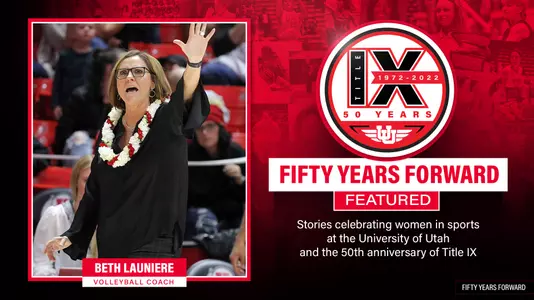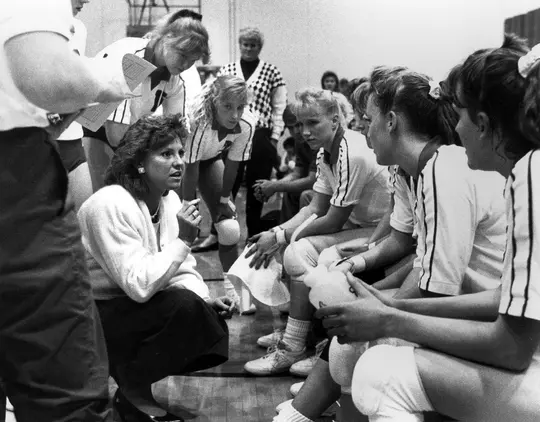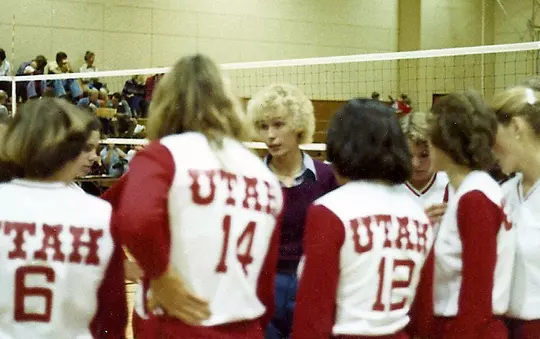Completed Event: General versus Arizona on January 18, 2002

General

7/12/2022 1:00 PM | General, Volleyball, Beach Volleyball
Beth Launiere, who has developed the Utah volleyball program into a perennial NCAA Tournament team, makes sure her players understand how current-day women’s athletics came to be.
Third In A Series
By Dirk Facer
Utah volleyball coach Beth Launiere has taught her teams a lot of things over the 32 years she’s been at the helm. The curriculum includes game plans, life lessons, and even a little history.
The latter involves Title IX and the subsequent journey as women’s sports programs have developed and grown the past 50 years.
“Usually, once a year now, I’ll ask them to do a little research on Title IX and bring in their findings,” Launiere said. “We’ll sit down for a little bit and talk about it because I want them to understand it.”
Berkeley Oblad, who played for the Utes from 2015-19, acknowledged those in the program have a good grasp on the issue.
“Beth has always been a huge advocate for women,” said Oblad, who is now a coach at Southern Utah. “I don’t remember the specifics of our conversations about Title IX, but I know we had them. Beth was always talking about women’s sports.”
Oblad added that Launiere encourages support for all of Utah’s other women’s teams, as well as female broadcasters and other prominent figures.
“She was a huge advocate of just everyone, all women who are in sports,” Oblad continued. “She talked about it all the time.”
In retrospect, Launiere noted that many of the student-athletes in her program knew about Title IX.
“But when they have to do just a little bit of research, they usually learn something new,” Launiere said. “And I think that's valuable for them.”

Three years after the passage of Title IX, Utah’s volleyball program officially began play on Oct. 17, 1975 with a loss at Wyoming. The Utes went 7-9 that season before topping the 20-win plateau twice over the three years that followed.
Norma Carr led the squad to a 77-60 record during her tenure from 1975-79 as the team’s first head coach. She also coached softball and assisted women’s athletic director Fern Gardner with basketball and some administrative duties.
“There was tightening of belts and there was figuring out how to get things, how to do things, and still make progress,” Carr said. “And I give Fern a lot of credit because she worked with them and (athletic director) Bud Jack to begin with and they made progress. Every year we made more and more progress.”
Despite her various responsibilities, Carr was only making graduate assistant’s pay. Her coaching staffs were paid from funds raised through camps or made up of volunteers.
Struggles existed on every level early on. Carr noted the challenges high schools faced in establishing sports programs for young women. She experienced that first-hand while working at Davis High when Title IX was enacted.
“It was all a process to get it where it is today,” Carr said. “But it was well worth it.”
I talk to my players about (Title IX) because you don’t want to lose the history of it. But we’re getting so far removed from it that it’s hard for female athletes to even understand what it did for them.Beth Launiere
Launiere also experienced the challenges of getting young girls into sports shortly after the passage of Title IX when she was in junior high.
“My friend and I wanted to try out for the boys’ basketball team since there was no girls’ team. We made the team but no one was happy about it. So, they decided to add a girls ‘play day’ so they didn’t feel like they needed to ‘let’ us on the team since they created another opportunity for us. It was really just one day of multiple events, almost like a PE class. It wasn’t the same.”
Launiere wants to make sure experiences like hers aren’t forgotten.
The journey is ongoing. Its anthem, of sorts, is the 37 words contained in Title IX: “No person in the United States shall, on the basis of sex, be excluded from participation in, be denied the benefits of, or be subjected to discrimination under any education program or activity receiving Federal financial assistance.”
It was a necessary piece of legislation to get things rolling. As Carr outlined, it took time, and coaches like Launiere have continued to help grow women sports, which, despite the challenges of their early years, have come a long way in 50 years.
NCAA women’s volleyball for instance is coming off its biggest championship match crowd last season of 18,755 and a record high viewership of 1,188,000 on ESPN. Other women’s collegiate sports have experienced similar growth.

Since the birth of the program in 1975, Utah volleyball has flourished over the past 47 years. The Utes have won 855 matches and been to the NCAA Tournament 18 times, including a current streak of six in-a-row. They’ve been ranked in the top 25 for 44 straight weeks.
The season before Launiere took over in 1990, Utah won just one match. After years of steady building, the Utes finally made their first NCAA Tournament appearance in 1998. Since then, Utah has advanced to the Sweet 16 four times.
Launiere is mindful of the road it took to get her program to this point. She's also aware that recent generations may not be completely aware of past hardships and the impact of Title IX has had on programs like hers.
“In our program I talk to my players about it because you don’t want to lose the history of it. That’s for sure,” Launiere said. “But we’re getting so far removed from it that it’s hard for female athletes to even understand what it did for them. I think it’s important for us to celebrate this anniversary and continue to do so.”
It may be a way to measure ongoing progress. Title IX, it could be said, is still a work-in-progress after 50 years.
On the positive side, Gardner points to the number of girls and women in sports and how that number has multiplied over the years.
“There’s a lot more opportunities,” said Gardner, who also noted careers in athletics administration and coaching. “I think that’s made a big difference.”
Change may be the only constant when it comes to Title IX’s quest for equality for women’s athletics. Launiere explained there’s been a cultural shift and people are seeing the value in it.
“It’s so much about education. It’s really a misnomer that it’s just hurt all the men’s sports because it’s just not true,” Launiere said. “And now there’s women’s programs standing on their own.”
It’s so much about education. It’s really a misnomer that it’s just hurt all the men’s sports because it’s just not true. And now there’s women’s programs standing on their own.Beth Launiere
Utah volleyball got a first-hand look at one last season with a trip to Nebraska. The Cornhuskers have a profitable volleyball program, receiving no financial contributions from student fees or taxpayers. They lead the nation in attendance with over 8,000 fans per match and have a current streak of 285 straight sellouts.
A crowd of 8,362 packed the Devaney Center in Lincoln on Sept. 11 when Utah came to town. After losing the first two games, the Utes rallied to win the match in an upset.
“We got 30 tickets and our fans were put way up at the top because their tickets are just invaluable,” Launiere said. “So there’s programs that are doing really, really well in women’s sports, for sure.”
Launiere’s program has been a successful draw as well, annually ranking among the top 25 women’s volleyball programs in attendance.
“I think that the sports today for women are just unbelievable as far as I’m concerned,” said Gardner, who added her belief that there couldn’t be anything more positive for it than Title IX.
Launiere has similar thoughts.
“Obviously, I find the role of Title IX critically important in the growth of women’s sports. I think it’s done a lot of good. But I think it’s always a work in progress,” she said. “I think it’s very, very necessary to continue with the progress that we’re making and it’s pretty amazing the progress we’ve made.”